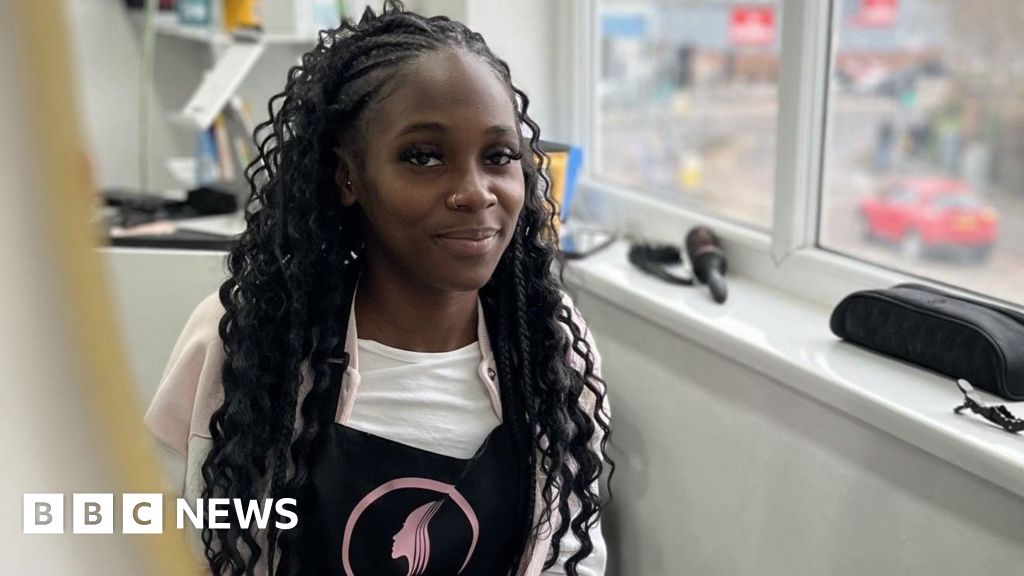Bongi MsimangaBBC Midlands Investigations Team
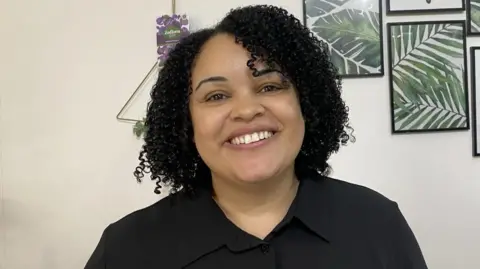 BBC
BBCWomen are travelling across the UK to get their afro hair cared for due to a lack of salons able to do it, a BBC investigation has found.
“They travel up to eight hours just to see [me] and they come and see me every four months,” hairdresser Chantel Daly said.
There are many in a similar situation as our investigation found only a third of colleges offering hairdressing courses are teaching students how to care for afro hair, four years after they were told they all should.
A directive from the Hair and Beauty Industry Authority (Habia) in 2021 said all hairdressers should be trained to work with afro-textured hair – its structure tends to make it naturally dry, delicate and prone to damage.
We contacted 259 colleges across England to ask if they taught an inclusive curriculum which included afro hair care and, of the 237 who replied, only 82 said they did.
Ms Daly had to spend an extra £2,500 to travel to London for training, after an advanced course at a local college in 2023 did not mention afro hair.
“The industry makes it impossible to be fully qualified to serve afro hair clients,” she said.
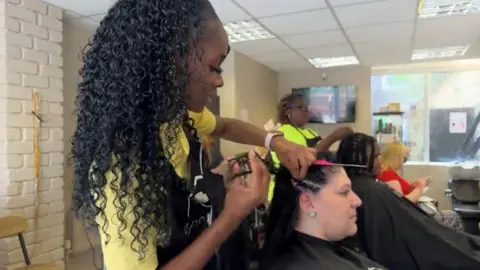
For Ms Daly the need is clear, with those clients forced to drive for hours to her salon in Shrewsbury, Shropshire, due to the lack of local options for their afro hair.
“I have clients from all over the country. My furthest client lives a few miles from Carlisle, so it’s about three-and-half hours and maybe even longer,” she said.
Ms Daly said she did not believe the industry considered people like her enough and it was something she wanted to help change.
“It makes my passion come even more alive. If I want to see real change, [I must] highlight the bigger issue – and that is that colleges don’t think about black people,” she added.
“I think it’s discrimination.”
Habia is the government-recognised organisation which sets standards for the hair, beauty, spa and aesthetic sectors but they do not have the power to enforce them.
‘I hated my afro hair’
The hairdressing industry recognises four main types of hair depending on its texture – straight, wavy, curly, and coily – with three sub-categories for each type, depending on the diameter of the individual strands of hair – fine, medium and thick.
Afro hair falls under the coily category.
Seeing the demand for afro hair care after finishing her law degree, Adora Lawrence switched careers and became a hairstylist for all types of hair.
“I started doing hair on the side and I realised that, when I finished uni, I just felt like I liked the whole working for myself,” the 27-year-old said.
Her own relationship with her hair was, she admitted, not great when she was younger, hating her afro hair when she was a child.
Growing up in Stoke-on-Trent, a city with a mainly white population, she said she felt alienated with her natural hair as “children would touch and make fun of it”.
Her family had to travel long distances to get her a hair appointment.
“If a family friend couldn’t do it at church, the furthest that I travelled was London,” she said.
“I got it done a few times in Birmingham, but Derby was my go-to. It was not straightforward when I was growing up to get it done.”
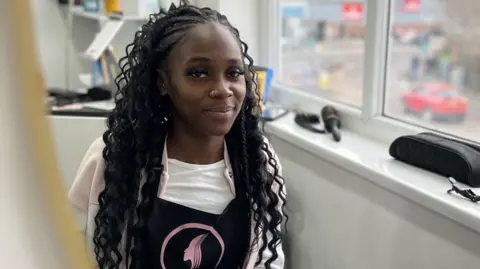
Ms Lawrence now advocates for cross-cultural hairstyling: “It’s not cultural appropriation for white people to wear afro hairstyles, just as it’s not [cultural appropriation] for black people to wear weaves or straight wigs.”
Black hair is often thicker than white hair, with a tendency towards curls or coils and it cannot always be styled in the same ways that straight hair often is.
Hair professionals we spoke to told us it is hard to find courses in order to be qualified to treat afro hair.
The BBC decided to find out just how hard and contacted every hair and beauty college in England who were registered on the government’s National Careers Service.
We asked them if their curriculum offered qualifications covering all four hair types.
Of the 259 we contacted, 237 responded and 155 told us they did not teach students how to care for afro hair.
The reasons given for the lack of teaching about afro hair varied from the colleges we approached.
Some said awarding bodies, which develop and set the curriculum for qualifications, have not updated their guidelines.
Others said they asked students to pay more to learn about afro hair, while some blamed a lack of clients with the hair.
In some cases, they said they have resorted to using afro hair mannequin heads due to a lack of real models.
But a third of the colleges did say they have started investing in training staff to expand their teaching.
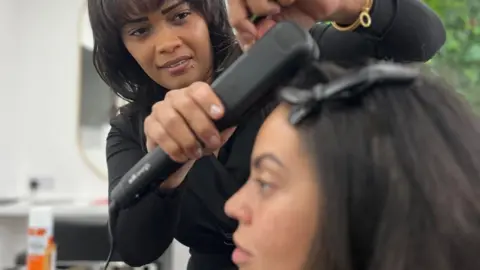
Erica Liburd, a Northampton-based tutor with more than 25 years of experience, said for her change would begin with open conversations.
She has taught afro hair care in the UK, Ireland and the Middle East, and said the industry needed to move faster in bringing in the changes.
She added: “Will it be done in the next two years or 10 or will we be talking about this in 20 years time? You’ve not given us a timeframe of how long it’s gonna take to actually get everybody upskilled.”
Ms Liburd said it was not fair to students that they were not taught about all types of hair.
“We’re not representing the majority of the community,” she added.
“There is still segregation, still an afterthought, and still an undervalued measure of the importance of integrating and weaving this throughout the learning.
“It can give some salon owners and educators the belief that it’s okay if they don’t do it.”
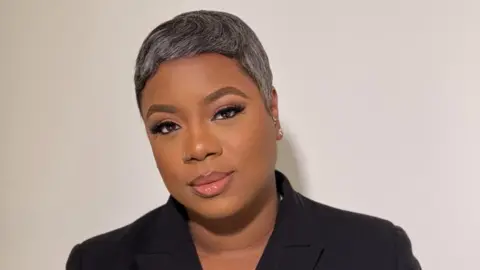 Erica Liburd
Erica LiburdJoan Scott, the chief executive of Habia, said she was frustrated at the length of time it was taking to see change, despite their directive in 2021.
“It’s taking longer than hoped,” she admitted, pointing to the awarding bodies as the key component responsible for updating qualifications.
“We created the new standards to reflect the UK’s diversity. Change is coming, but it will take time.”
Of the awarding groups contacted by the BBC, two of the biggest explained their positions.
The Vocational Training Charitable Trust (VTCT) said they have updated their curriculum – but for them it was only mandatory for students “to be assessed on three of the four hair types”.
City and Guilds said their courses met occupational standards but did not specify if all hair types were mandatory.
